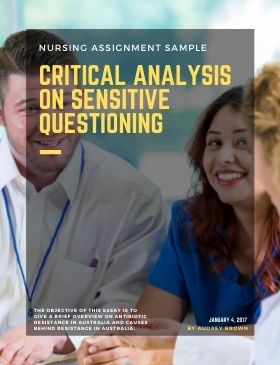
You can download the sample Nursing Case Study on Significance of Jewish Culture on Palliative Care Nursing with the following question for free at the end of this page. For further assistance with Nursing Assignment help, please check our offerings in Nursing assignment solutions. Our subject-matter experts provide online assignment help to Nursing students from across the world and deliver plagiarism free solution with a free Turnitin report with every solution.
(AssignmentEssayHelp does not recommend anyone to use this sample as their own work.)
Nursing Assignment Question
Students will critique (not describe) an online substance-use interview. Your critique will be based on information and interviewing techniques provided via online tutorial activities and other materials available on the Moodle site.
You are to provide a written critique of an online substance-use interview (a link to this will be provided via the Moodle site in the 'assessment 1' folder). Your critique in essay format is to include the following sections:
Exploration of the way in which the interviewer's initial contact with the person occurred:
• Examination of the levels of rapport and respect established by the interviewer;
• The degree to which the interviewer addressed the person's readiness to change their behavior/s;
• The extent to which the interviewer identified the impact of lifestyle and substance use on the person's health;
•The extent to which the interviewer identified stresses related to the person's substance use and lifestyle;
• The overall level of engagement between the person and interviewer throughout the interview;
•The manner to which the interview was concluded.
Headings are to be used in your essay to identify each section. As part of your essay, you are to explain and justify your answers (citing appropriate literature).
Read more in the complete solution PDF document at the end of this page.
Nursing Assignment Solution
INTRODUCTION
Establishing therapeutic relationships with clients of co-occurring substance abuse is much difficult, yet an integral part of mental health care and rehabilitation (Mueser, et al., 2012). Assessment of client helps counselors and clinicians to assess the degree of severity of complexities and design treatment regimen with accordance to conditions (Delgadillo, et al., 2012). The chance of bias and judgmental conclusion in such cases run high, implicating there must be optimized protocol which act as a guideline for the assessor or the interviewer. Establishment of good rapport and relationship (therapeutic) is utmost important to win trust of client and retrieve information which will help in recovery of client (Stieglitz & Raes, 2015). This piece of article critically analyses an interview between pharmacotherapy counselor Jess and her client Steve. The interview was designed by Victoria initiative under dual diagnosis heading and issued as a training material for mental health workers and counselors. The video demonstrates how sensitive questioning should be carried out with clients of dual diagnosis.
EXPLORATION OF INTERVIEWERS CONTACT
Interviewers initial contact method as well as mechanism is the best predictor of health outcome in a psychological interview session (Copeland, McNamara, Kelson, & Simpson, 2014). From the video, it was evident Jess introduced herself as assessor who is there for a comprehensive assessment of substance abuse and dual diagnosis of Steve. She greets Steve and speaks three lines about her and starts with the questioning. Although, this is the standard method of interview, there is always room for improvement in case of initial contact. Research suggests clients are more interactive if they found counselors nurturing, non-judgmental and empathetic (Feit, Fisher, Cummings, & Peery, 2015). Jess could have established better initial contact by asking general questions about breakfast, about day's start, planning for the day, etc. The rationale is to bring client in a zone of trust and comfort (Brown, Bennett, Li, & Bellack, 2011). Evidence shows, individuals suffering from dual diagnosis are usually looking down by the society and community which limits their societal functioning. This in turn affects their self-integrity and self-esteem (Chou, Robb, Clay, & Chronister, 2012). The video shows, the client although nods to interviewer for a session, he was unable to make eye contact which might be due to low self-esteem. During initial stage of interview he looks towards wall clock for time, indicating he might have some works and he might be in a hurry to complete the session (Darghouth, Nakash, O. Miller, & Alegría, 2012). Therefore, taking the client into a therapeutic zone of trust, belief and showing client that they are normal individuals and can be brought to mainstream society with little self help boost their confidence (Hettema & TKirsch, 2011). In the interview session the counselor asks Steve 'Have you been to such service before?' Although the guidelines from Victoria initiative about sensitive questioning suggest non-judgmental questions and open ended question should be asked, the above question indicates it is judgmental and concluding that Steve needs an assessment for his problem. If the question would have been asked – Have you availed any medical service for any ailments or mental health issues? , it would have a greater therapeutic binding effect on client. In most cases, clients of dual diagnosis are demoralized by society's perception and portray of their personalities as bad guys, therefore establishment of therapeutic relationship although very difficult yet it exists for dual diagnosis patients (Van Boekel, Brouwers, Van Weeghel, & Garretsen, 2012). The communication plays the most important role from start to end in an interview session.
EXAMINATION OF INTERVIEWERS RAPPORT AND RESPECT
Establishing rapport is an important aspect while assessing clients for substance abuse or dual diagnosis. Establishing rapport is a part of motivational interview usually employed for certain group of people, but can be implemented in general interviewing session too (Ness, Borg, & Davidson, 2014). Establishment of rapport requires a little bit of information on client's choice, social history or his/her preference for a particular problem or issue (DeVido & Weiss, 2012). In this case, although interviewer successfully established respect with Steve evident from the total interview, rapport could have been enhanced based upon evidence based literature. Building rapport helps in establishing a working alliance for a longer duration (Clarkson, et al., 2013). Jess introduces the service which she will be providing and clears him through her words that she is there for a normal assessment which Steve acknowledges positively. This indicates interviewer's establishment of respect and client's acknowledgement of interviewers intentional questioning with respect. As discussed in previous section, therapeutic alliance is necessary for proper assessment; similarly rapport establishment indicates the interviewers respect to client, his work, and client as a whole different entity (Madson, et al., 2013). It makes the session more interactive by placing client's choice in first priority rather than interviewers goals. Respect for autonomy, genuineness and collaboration helps in establishing rapport. Jess shows good listening skills and engaging communication skills during the whole interview which is an important part of rapport building too (Prout & Wadkins, 2014). The building of acceptance and safety environment is crucial for rapport establishment which was lacking and it seems counselor jumped to main issue prematurely which could have logically placed after establishing therapeutic relationship and rapport.

INTERVIEWER ADDRESSAL OF BEHAVIORAL CHANGE DURING INTERVIEW
Behavior change is a part of treatment and recovery process which is usually implemented post assessment or screening of client (Sacks, Ries, Ziedonis, & Treatment, 2005). As sensitive questioning is a screening tool, interviewer is not expected to carry out cognitive behavioral therapy to address client coping strategies and enhancement. However, Jess was able to initiate behavioral change process a little bit by asking coping strategies followed by Steve. In later part of interview, Jess was able to retrieve Steve's family status and how his drinking has affected his separation from kids which breaks down client and he cries till jess leaves. Although, it was not meant for behavioral change yet it addresses the issue by making him realize that his actions are not helping him. The interview session demonstrates no behavioral change strategy was addressed by counselor although she puts open ended questions to know about Steve opinion on recovery process. Thus, it was a good move from Jess point of view since this was a screening tool; behavioral change strategy cannot be expected in this session (Feit, Fisher, Cummings, & Peery, 2015). Jess strategy is appreciable as she manages to retrieve important information which will assist the team in helping Steve for recovery and rehabilitation.
INTERVIEWERS IDENTIFICATION OF IMPACT and STRESSES OF SUBSTANCE ABUSE
It is very important from client and counselor perspective to know how substance abuse and other conditions affect one life to what degree. This section was well handled by the counselor rather she adhere to the guideline goals i.e. detection of limits of substance abuse and how it impacts. The initial loopholes discussed previously were compensated in these two sections. The counselor initiated on a lighter note asking about his job, part time or full time. Research suggests dual diagnosed clients are more prone to unemployment due to dependence upon substance and resulting behavior (Eddie, 2013). She got to know Steve lost his driving license couple of years back. Her questions about alcohol and frequency with a number guess gave her exact frequency of alcohol intake of her client. She tried to retrieve information about his daily life by asking weekend time and got to know Steve isn't much social. She clears out the issue with client by saying these areas are required to determine how it impacts his life from different aspects. If the total interview session will be analyzed, it was a mix of open ended and closed ended questions. This mix method strategy has been reported to provide much more information than a single method (Daley, 2013). Research evidence suggest assessment sessions must target two priority goals while interviewing such sensitive patients such as client's understanding of problems, secondly client's understanding of effect of substance abuse or excessive drinking (in this case) on family and social life (Miller & Rollnick, 2012). Jess uses her emotional intelligence to collect every small piece of information such as loosing of driving license, wife staying away, no definitive employment, monetary issues and poses an open ended question to client. The rationale of such approach is to make client realize how it has affected his family, social and professional life at the same time asking about his coping strategies reveals the client's desire for change. Therefore, with regard to interviewer strategy to retrieve information and assess to what degree it has affected his client life is appreciable and justified logically.
LEVEL OF ENGAGEMENT
The level engagement can be rated as good, but could have been much better if proper space and time would have been facilitated at the starting of the session. As discussed, already the client seems to be in a stressed state and the stress amount increased later due to his realizations of effects, a well-balanced therapeutic relationship establishment could have given much better information on his drinking behaviors and the causal factors and risk factors for such behavior (Rush, 2015). While the interview session was short i.e. approximately thirteen minutes it could have been extended for better goal achievement. ………
(Some parts of the solution has been blurred due to privacy protection policy)



 WhatsApp Us
WhatsApp Us